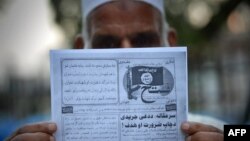There are signs the Islamic State (IS) terrorist organization is making inroads among militants operating in Pakistan.
The Pakistan Taliban has responded to the group’s reported expansion plan in South Asia by proposing what appears to be a loose alliance. But security officials say the country is prepared to deal with the threat because of its decade-long counter-militancy experience.
IS propaganda pamphlets translated into local languages have been spotted in parts of northwestern Pakistan and Afghan border provinces in recent weeks, prompting concerns the group is seeking to expand its influence to a region already plagued by Islamist insurgencies.
U.S. and Pakistani officials play down these reports as the acts of individuals influenced by social media, and say they have yet to authenticate IS footprints in Afghanistan or Pakistan.
Pakistani security officials say that recent stepped up military offensives, particularly in North Waziristan tribal district near the Afghan border, are aimed at preventing militant networks like the Islamic State group from establishing influence or helping the Pakistani Taliban, as the bulk of the U.S.-led coalition forces withdraw from Afghanistan.
‘Carefully watching’
Army spokesman Major-General Asim Saleem Bajwa told VOA national security institutions have been asked to ensure developments in the Middle East do not undermine the country’s ongoing counter-militancy efforts.
“In today’s globalized world, everything has a domino effect. It can spread anywhere and across the world. We are very carefully watching all the developments in the region that we live in, or beyond the region, and we take measures accordingly," Bajwa said.
"We will make sure that no terrorists carry out terrorist activities within the country and they do not use our soil for carrying out any activities elsewhere,” he added.
While a splinter group of the Pakistani Taliban has announced allegiance to the Islamic State, the al-Qaida-linked anti-Pakistan organization has not.
This week, a statement from the fugitive leader of the Pakistani Taliban, Maulvi Fazlullah, praised the Islamic State battles in Syria and Iraq and promised to help their “Muslim brothers” if they asked for it.
But he reiterated his group’s allegiance remains with the leader of the Afghan Taliban, Mullah Omar. He also advised the Islamic State fighters against hastily declaring people infidels and executing them.
Pakistani columnist Zahid Hussain says the Islamic State group, also known as ISIS, has mainly benefited from the chaotic situations and collapsing state structures in Iraq and Syria.
Hussain said Pakistan has a robust security structure that has prevented al-Qaida and the Pakistani Taliban or TTP from imposing their extremist ideology on the country.
“Al-Qaida has been operating here for so long and they have also declared a war on the Pakistani state. But I think [the] Pakistani state is still powerful to confront this challenge," Hussain said.
"Even al-Qaida or TTP has never been able to really actually make inroads among common Pakistanis. So, if ISIS gets more of a foothold in this country, we may see a rise in terrorism, but they will not be able to do the same things as they have been doing in the Middle East. But certainly if some [Pakistani] militant groups join or unite under the ISIS banner, we may see more bloodshed in this country,” Hussain said.
Critics believe that without developing an effective long-term counter-terrorism strategy, countries like Pakistan will remain exposed to interventions by extremist forces like Islamic State militants.
‘Cancerous menace’
Afghan ambassador to Pakistan Janan Mosazai said his country is also aware of the disastrous consequences if the Islamic State is able take root in Afghanistan after international troops leave.
Mosazai emphasized the need for enhanced bilateral and regional cooperation to guard against such an eventuality.
“The terrorists, they recognize each other, they work with each other, they support each other, and to be able to tackle effectively, to be able to defeat them, to be able to free our societies, our two countries from this cancerous menace, we have to be able to come together, our security institutions, our armies, our intelligence agencies ... because otherwise this evil will only get bigger and more dangerous. Look at the situation in the Middle East these days,” Mosazai said.
Ahmer Bilal Soofi, a former Pakistani law minister, said more emphasis should be placed on de-radicalization.
“The IS phenomenon and their thought process is confined to a hardcore radical group that the moderate Muslims (in Pakistan) do not associate themselves with that at all," Soofi said.
"The question is how do you make sure that IS phenomenon or their radical thought process does not spill over in countries like Pakistan and Afghanistan and other Muslim countries," he added. "I think the starting point should be to make sure that those who are in jails as inmates in some of these countries are also taken through the process of de-radicalization as a national strategy because a lot of people that eventually find their way out from the judicial system either through bails or through acquittals are the primary breeding ground for the IS phenomenon and they become one of the major carriers of this thought process."
Suspected militants detained
Soofi added that Pakistan has detained as many as 3,000 suspected militants in counter-militancy operations around the country over the past many years.
But he stressed that the national judicial system lacks the capacity to expeditiously try and sentence these people. He said Pakistan’s leaders have not yet devised a policy to address the issue.
The militants operating in Pakistan come from the country’s majority Sunni population.
Some observers worry that a possible rise of the fiercely anti-Shi’ite Islamic State could fuel a bloody sectarian conflict with the country’s minority Shi’ite population.




